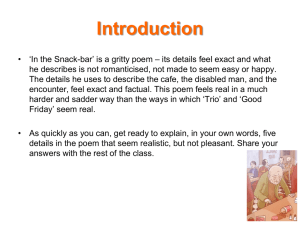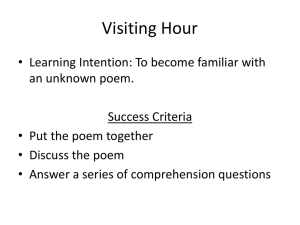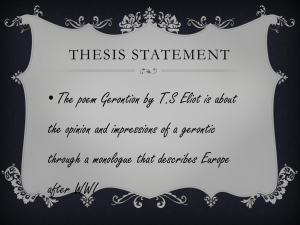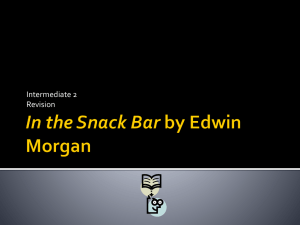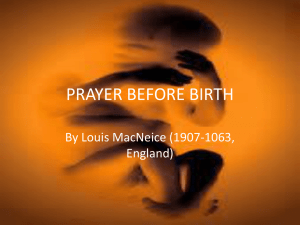In the Snack-Bar
advertisement
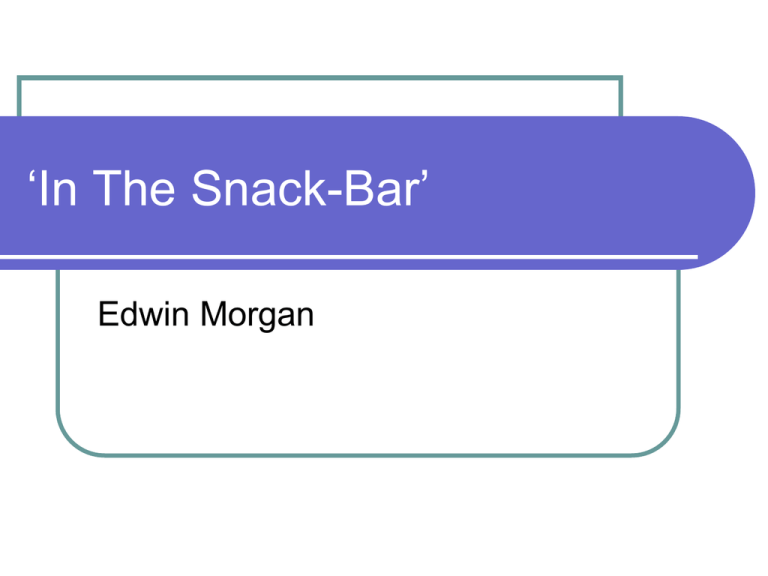
‘In The Snack-Bar’ Edwin Morgan Good Morning S5! In today’s lesson, we will… Practice textual analysis. Study Morgan’s poem ‘In the Snack-Bar’. Talk about poetic devices. In the Snack-Bar This poem describes an encounter with an old disabled man in a busy snack-bar. The poem explores the extent of his disabilities, the effect they have on his life and society’s attitude to the disabled. As well as society’s attitude to the disabled, the other main theme in the poem is determination of the human spirit. In the Snack-Bar Stanza 1 This stanza reveals the full extent of the old man’s disabilities through the eyes of an outsider observing the incident. How does the poet arouse sympathy for the old man in this stanza? Note down your thoughts on word choice, simile, personification and sentence structure. In the Snack-Bar Stanza 1 CONTRAST is shown with “A few heads turn in the crowded evening snack-bar”. This shows society’s lack of interest in those less fortunate. Every movement the old man makes takes momentous effort. “Slowly he levers himself up..” In the Snack-Bar Personification – “The dismal hump looming over him forces his head down.” Simile – “He stands in his stained beltless gabardine like a monstrous animal caught in a tent in some story.” At first the observer looks at him like he is a monster in a scary story. The old man has outsider status. In the Snack-Bar At first the old man evokes revulsion – “dismal hump”, “Stained beltless gabardine”, “monstrous animal”. “His face not seen” – no face visible to express and affirm his humanity. He is faceless and inhuman. Note the clever positioning of “if he could see” – at the end of the sentence to emphasise. In the Snack-Bar The reader now starts to sympathise with the old man as he is blind and looks uncared for. “his stick, once painted white but scuffed and muddy..” Morgan uses a list to emphasise the multiple physical disabilities the old man has to contend with. The horror of his predicament is conveyed by the words used to describe him. In the Snack-Bar Stanza 2 Sensing the old man’s need, the speaker quickly relinquishes his role as observer and moves to help him. Morgan enters the poem here and empathises with the old man. This has the effect of generating understanding and compassion in the reader. In the Snack-Bar “I take his arm. “Give me – your arm – it’s better,” he says.” The old man accepts the stranger’s help – but only as long as he can direct it. CONTRAST; “A few yards of floor are like a landscape..” The dangerous journey across the floor is described with a focus on the senses. The poet experiences what the old man does, being blind his other senses are heightened. “crunch”, “table edges”, “hiss” etc. In the Snack-Bar “And slowly we go down. And slowly we go down.” This repetition conveys the slow rhythm of their movement as well as emphasizing the disabilities of the old man. CONTRAST – the appearance of the toilet with the appearance of the old man. “White tiles and mirrors…He shambles uncouth into the clinical gleam.” The old man’s actions increase our sympathy for him. “Painful”, “doubtfully”, “feebly”. In the Snack-Bar Repetition – “He climbs, we climb.” “And slowly we go up. And slowly we go up.” CONTRAST – “with that one persisting patience of the undefeated which is the nature of man when all is said.” This contrasts from our first impression of the old man as monstrous. Morgan uses the old man to highlight mankind’s determination and will to prevail. PARADOX – “The faltering, unfaltering steps.” “that endless, yet not endless waste of floor.” This shows the old man’s determination. In the Snack-Bar Stanza 3 Morgan moves beyond the incident in the snack-bar to examine what impact the old man’s disabilities have on the quality of his life. What comment is Morgan making about the nature of human beings? In the Snack-Bar The poet helps us understand the problems faced by the old man and the effect he has on others. The CONTRAST is in the darkness of his blind world where he must “trust men.” “Without embarrassment or shame he must announce his most pitiful needs in a public place.” In the Snack-Bar “Does he know how frightening he is...” Society fears him. “His life depends on many who would evade him.” Morgan emphasises his vulnerability in a society which would prefer to pretend he doesn’t exist. Morgan criticises the nature of humans who would ignore the old man. The poet’s reaction - “Dear Christ, to be born for this!” conveys pity for the old man’s condition and yet also wonder at his reality. In the Snack-Bar Techniques in the poem include... Alliteration Enjambment Onomatopoeia Repetition Contrast Simile Personification Tone Metaphor Rhyme

